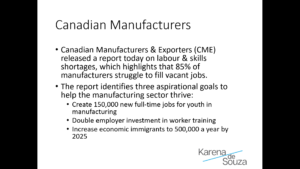
29 Oct Skills mismatch vs Underemployment
E28:
Once upon a time …
the story went, if we went onto post-secondary education, kept our heads down and our grades up, we would have the security of a fulfilling job.
It is the promise that fueled immigration to developed nations so that parents could pull their children up the economic ladder through the wonders of education.
Not so, anymore
But suddenly, we find ourselves in the middle of a conundrum in 2019.
- We have a record number of job openings.
- We have the greatest number of well-educated un- and under-employed Millennials and Generation Zs
It just does not make sense and was an active topic of discussion among parents and educators when I presented at the HDSBPIC parent conference in Oct 2019.
How could this be?
One phrase that keeps coming up is
Skills mismatch
I highlighted 2 separate reports:
Canadian Manufacturing and Exporters (CME) reported that 85% of manufacturers were struggling to fill their vacant jobs. The skill shortage is severe enough that it is stifling innovation, expansion, and growth.
When you consider that the manufacturing sector accounts for 11% of GDP, suddenly this becomes everyone’s problem – as well as an opportunity.
They are recommending that alongside increased jobs for youth and reskilling of current workers, that the Government increases economic immigration to the country to 500,000 a year by 2025 to help manage the gap.
In the next episode I will talk to the Thrive Global report which quotes from the 2018 Manpower Group study.
The opportunity for GenZ
What does this mean for a young adult either in post secondary education, or making the choice for a career?
- Get some qualification: Jobs across all sectors are getting more sophisticated. A post-secondary education is almost the price of admission for a job interview nowadays. Advanced techniques mean that the manufacturing floor has fewer humans, but they are much more engineering savvy with a basic understanding of programming and robot management. A full four-year degree is not necessary, but some certifications are useful. More importantly, incorporate some of the skills that manufacturing is hungry for into your everyday curriculum.
- Do your research: Keep your eye on some valuable and relevant job experience in a growth sector like manufacturing that are struggling for staffing. Local manufacturers are a great place to target as they often do not have a deep succession tree. Co-op and internships at such organizations will add valuable experience. Often the career progression is rapid as the management layer is flat and the opportunity to learn is greater.
Next time around, the Thrive Global report.




No Comments